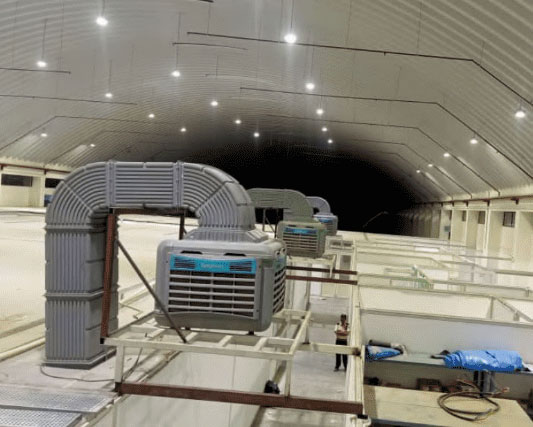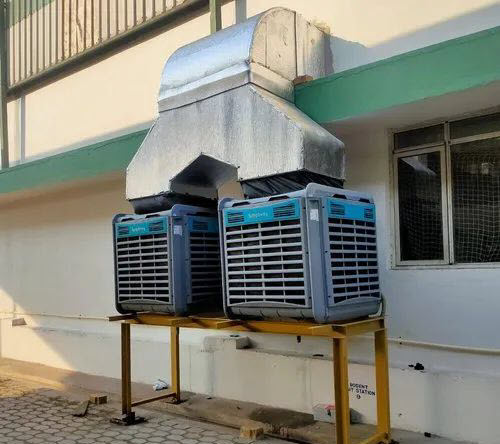Sustainable Environmental Management: Exploring the Ecological Benefits of Duct Air Cooler Systems

In the quest for sustainable environmental management, innovative solutions that reduce our carbon footprint and enhance energy efficiency are more crucial than ever. Among these solutions, duct air cooler systems stand out for their potential to revolutionize the way we approach cooling in residential and commercial buildings.
How Duct Air Coolers Work
Duct air cooler systems operate on the principle of evaporative cooling. By passing outdoor air over water-saturated pads, these systems utilize the natural process of water evaporation to cool the air. This cooled, moist air is then distributed throughout the building via ducts, providing a comfortable indoor environment. This process not only requires less energy compared to air conditioning but also utilizes a natural cooling mechanism, significantly reducing the environmental impact.
Comparison with Other Cooling Systems
Cooling systems, such as air conditioners, rely heavily on refrigerants and consume a considerable amount of electricity. In contrast, duct air coolers offer a more energy-efficient and eco-friendly alternative. By leveraging the natural process of evaporation and consuming significantly less electricity, duct air coolers represent a sustainable cooling solution that aligns with environmental management goals.
Environmental Advantages
Energy Efficiency and Reduction in Carbon Footprint
Duct air coolers are synonymous with energy efficiency. Their operation requires significantly less electricity than cooling systems, directly translating to lower energy consumption and a reduced carbon footprint. This efficiency is a cornerstone of sustainable environmental management, contributing to the global effort to mitigate climate change.
Water Conservation and Usage
Although duct air coolers utilize water for cooling, they are designed to maximize water efficiency. Modern systems include features that recirculate water and minimize waste, contributing to water conservation efforts. In areas where water scarcity is a concern, these systems can be adjusted to use minimal water, further enhancing their sustainability profile.
Contribution to Air Quality
Unlike air conditioners that can emit harmful refrigerants, duct air coolers provide a natural form of cooling that does not rely on chemical refrigerants. Moreover, by continuously circulating fresh outdoor air, these systems can improve indoor air quality, making them beneficial for both the environment and human health.
Economic Benefits
Cost-Effectiveness and Savings
The energy efficiency of duct air coolers not only benefits the environment but also translates to economic advantages for users. Lower energy consumption means reduced utility bills, offering significant savings over time. This cost-effectiveness makes duct air coolers an attractive option for both residential and commercial users looking to manage cooling expenses sustainably.
Long-Term Financial Impacts for Businesses and Households
Investing in duct air cooler systems can yield substantial long-term financial benefits. Beyond the immediate savings on energy bills, these systems typically have lower installation and maintenance costs compared to air conditioners. Their durability and efficiency also mean that businesses and households can enjoy these financial benefits for years to come, making duct air coolers a wise investment in sustainable cooling technology.
Challenges and How They Were Overcome
Despite their many benefits, the adoption of duct air coolers has faced challenges, including initial skepticism and the need for public awareness. However, through education and demonstration of their effectiveness, these challenges have been increasingly overcome, leading to wider acceptance and implementation of duct air cooler systems as a sustainable cooling solution.

Sustainable Environmental Management
Role of Duct Air Coolers in Sustainable Development
Duct air coolers represent a vital tool in the pursuit of sustainable development. By providing an efficient, eco-friendly cooling solution, they address key environmental challenges such as energy consumption, water use, and greenhouse gas emissions. Their integration into sustainable environmental management strategies is essential for achieving a balance between human comfort and environmental preservation.
FAQs About Duct Air Cooler Systems
Duct air coolers contribute to energy efficiency through their operational principle of evaporative cooling, which requires significantly less electricity than refrigerant-based air conditioning systems. This process efficiently lowers indoor temperatures using water evaporation, which consumes less energy, leading to reduced energy bills and a lower carbon footprint.
Duct air coolers are most effective in dry, arid climates where the process of evaporative cooling can be maximized due to the low humidity levels. However, advances in technology are improving their efficiency and making them more adaptable to a wider range of climates by optimizing humidity control and ventilation within indoor spaces.
Initially, duct air coolers are often less expensive to install than air conditioning systems. Additionally, their operational costs are lower due to their higher energy efficiency and the use of water as a cooling medium instead of chemical refrigerants. Over time, these factors can lead to significant savings on utility and maintenance costs.
Yes, duct air coolers can be integrated with existing HVAC systems. This integration allows for a versatile approach to indoor climate control, combining the benefits of evaporative cooling with heating and cooling methods. It requires careful planning and installation to ensure optimal performance and efficiency.
Maintenance requirements for duct air coolers typically include regular cleaning of the cooling pads and water tanks to prevent mold and bacteria growth, checking and cleaning the fan and motor components, and ensuring the proper functioning of the water distribution system. Regular maintenance ensures efficient operation and prolongs the lifespan of the system.



